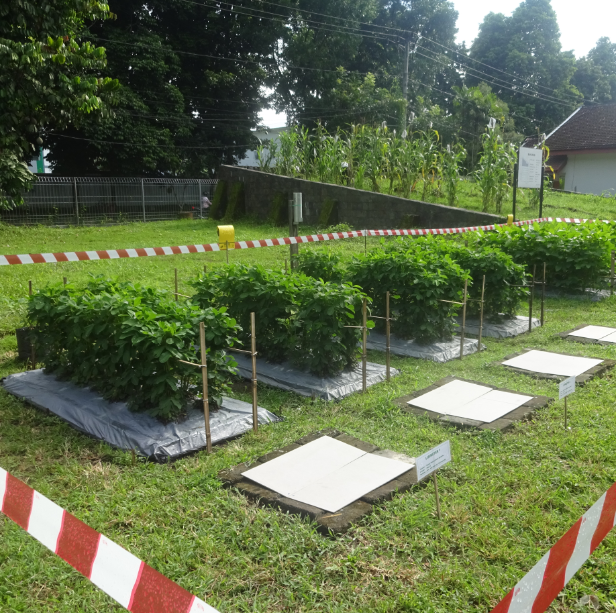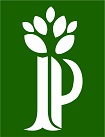
Effect of deficit irrigation on the growth and yield of peanuts (Arachis hypogaea (L.) Merr.) compared to AquaCrop model simulation
Febery Hery Suandana(1), Cahyoadi Bowo(2*), Sigit Soeparjono(3)
(1) University of Jember
(2) University of Jember
(3) University of Jember
(*) Corresponding Author
Abstract
Keywords
Full Text:
PDFReferences
Adeboye, O. B., Schultz, B., Adeboye, A. P., Adekalu, K. O., and Osunbitan, J. A. (2020). Application of the AquaCrop model in decision support for optimization of nitrogen fertilizer and water productivity of soybeans. Information Processing in Agriculture, pp. 1–3.
Allen, R. G., Pereira, L. S., Raes, D., and Smith, M. (2006). Crop evapotranspiration-guidelines for computing crop water requirements-FAO Irrigation and Drainage Paper 56. Roma : FAO (Food and Agriculture Organization), pp. 161–170.
Aziz, M., Rizvi, S. A., Sultan, M., Bazmi, M. S. A., Shamsiri, R. R., Ibrahim, S. M., and Imran, M. A. (2022). Simulating cotton growth and productivity using AquaCrop model under deficit irrigation in a semi-arid climate. Agriculture (Switzerland), 12(2), pp. 1–18.
Brown, B. C. and Knowles, D. A. (2021). Welch-weighted egger regression reduces false positives due to correlated pleiotropy in mendelian randomization. The American Journal of Human Genetics, 12(2), pp. 2319–2335.
Foster, T., Brozovic, N., Butler, A. P., Neale, C. M. U., Raes, D., Steduto, P., Fereres, E., and Hsiao, T. C. (2017). AquaCrop-OS : an open source version of FAO's crop water productivity model. Agricultural Water Management, 11(11), pp. 18–22.
Chibarabada, T. P., Modi, A. T., and Mabhaudhi, T. (2020). Calibration and evaluation of AquaCrop for groundnut (Arachis hypogaea) under water deficit conditions. Agricultural and Forest Meteorology, 11(17), pp. 1–2.
Er-Raki, S., Bouras, E., Rodriguez, J. C., Watts, C. J., Lizarraga-Celaya, C., and Chehbouni, A. (2020). Parameterization of the AquaCrop model for simulating table grapes growth and water productivity in an arid region of Mexico. Agricultural Water Management, 20(5), pp. 1–2.
Gebremedhin, M. A., Lubczynski, M. W., Maathuis, B. H. P., and Teka, D. (2022). Deriving potential evapotranspiration from satellite-based reference evapotranspiration, upper ekeze Basin, Northern Ethiopia. Journal of Hydrology: Regional Studies, 41(4), pp. 2–3.
Giménez, L., Paredes, P., and Pereira, L. S. (2017). Water use and yield of soybean under various irrigation regimes and severe water stress. Application of AquaCrop and SIMDualKc Models. Water, 9(393), pp. 1–18.
Han, C., Zhang, B., Chen, H., Liu, Y., and Wei, Z. (2020). Novel approach of upscaling the FAO Aquacrop model into regional scale by using distributed crop parameters derived from remote sensing data. Agricultural Water Management, 240(5), pp. 1–2.
Harahap, F. S., Purba, J. and Rauf, A. (2021). Hubungan curah hujan dengan pola ketersediaan air tanah terhadap produksi kelapa sawit (Elaeis guineensis Jacq) di dataran tinggi. Agrikultura, 32(1), pp. 37–38.
Iskandar, I., Suryaningtyas, D. T., Baskoro, D. P. T., Budi, S. W., Gozali, I., Suryanto, A., Kirmi, H., and Dultz, S. (2022). Revegetation as a driver of chemical and physical soil property changes in a post-mining landscape of East Kalimantan: a chronosequence study. Catena, 215(10), pp. 1–2.
Liu, Y., Jiang, Q., Wang, Q., Jin, Y., Yue, Q., Yu, J., Zheng, Y., Jiang, W., and Yao, X. (2022). The divergence between potential and actual evapotranspiration: an insight from climate, water, and vegetation change. Science of the Total Environment, 9(14), pp. 1–2.
Karagöz, D. (2016). Modified welch test statistic for ANOVA under weibull distribution. Journal of Mathematics and Statistics, 45(2), pp. 561–573.
Kelly, T. D. and Foster, T. (2021). AquaCrop-OSPy : bridging the gap between research and practice in crop-water modeling. Agricultural Water Management, 254(5), pp. 1–2.
Khov, S., Vote, C., Hornbuckle, J., Inthavong, I., Oeurng, C., Sengxua, P., Sihathep, V., Song, L., and Eberbach, P. (2017). Calibration and validation of aquacrop for irrigated peanut (Arachis hypogaea) in lowland rice systems of Southern Laos. Modelling and Simulation, 12(8), pp. 223-229.
Kuwagata, T., Murai, H. M., Matsunami, M., Terui, S., Nagano, A. J., Maruyama, A., and Ishida, S. (2022). Hydrometeorology for plant omics: potential evaporation as a key index for transcriptome in rice. Environmental and Experimental Botany, 196(11), pp. 1-2.
Serrano, S. M. V., Castro, F. D., Reig, F., Begueria, S., Burguera, M. T., Latore, B., Angulo, D. P., Noguera, I., Rabanaque, I., Luna, Y., Morata, A. and KenawyA. E. (2022). A Near Real-Time Drought Monitoring System for Spain using Automatic Weather Station Network. Atmospheric Research, 271(11), pp. 1–2.
Liu, Z. (2022). Estimating land evapotranspiration from potential evapotranspiration constrained by soil water at daily scale. Science of the Total Environment, 834(4), pp. 1–2.
Lyons, D. S., Dobrowski, S. Z., Holden, Z. A., Maneta, M. P., and Sala, A. (2021). Remote sensing of environment soil moisture variation drives canopy water content dynamics across the Western U. S. Remote Sensing of Environment, 253(11), pp. 1–2.
Man, A., Chaichana, C., and Wicharuck, S. (2019). Predicting sunlight availability for vertical shelves using simulation. Energy Technology for Environment Research Center, 20, pp. 4–5.
Mujiyo, Nugroho, D., Sutarno, Herawati, A., Herdiansyah, G., and Rahayu. (2022). Evaluasi kemampuan lahan sebagai dasar rekomendasi penggunaan lahan di Kecamatan Ngadirojo Kabupaten Wonogiri. Agrikultura, 33(1), pp. 56-57.
Nikolaou, G., Neocleous, D., Kitta, E., and Katsoulas, N. (2022). Assessment of the priestley-taylor coefficient and a modified potential evapotranspiration model. Pre-Profof, 5(27), pp. 10–11.
Nomura, K., Saito, M., Kitayama, M., Goto, Y., Nagao, K., Yamasaki, H., Iwao, T., Yamazaki, T., Tada, I., and Kitano, M. (2022). Leaf area index estimation of a row-planted eggplant canopy using wide-angle time-lapse photography divided according to view-zenith-angle contours. Agricultural and Forest Meteorology, 319(4), pp. 1–2.
Nsabagwa, M., Byamukama, M., Kondela, E., and Otim, J. S. (2019). Towards a robust and affordable automatic weather station. Development Engineering, 4(5), pp. 1–2.
Paredes, P., Wei, Z., Liu, Y., Xu, D., Xin, Y., Zhang, B., and Pereira, L. S. (2015). Performance assessment of the FAO Aquacrop Model for soil water, soil evaporation, biomass and yield of soybeans in North China Plain. Agricultural Water Management, 12(152), pp. 57–71.
Pirmoradian, N. and Davatgar, N. (2019). Simulating the effects of climatic fluctuations on rice irrigation water requirement using AquaCrop. Agricultural Water Management, 213(10), pp. 97–98.
Puértolas, J., Albacete, A., and Dodd, I. C. (2020). Irrigation frequency transiently alters whole plant gas exchange, water and hormone status, but irrigation volume determines cumulative growth in two herbaceous crops. Environmental and Experimental Botany, 176(2), pp. 1–2.
Rahmianna, A. A., Pratiwi, H., and Harnowo, D. (2012). Budidaya kacang tanah. Monograf Balitkabi, 40(13), pp. 133–169.
Silva, V. P. R., Silva, R. A., Maciel, G. F., Braga, C. C., Silva, J. J. L. C., Souza, E. P., Almeida, R. S. R., Silva, M. T., and Holanda, R. M. (2018). Calibration and validation of the Aquacrop Model for the soybean crop grown under different levels of irrigation in the Motopiba Region, Brazil. Ciência Rural, 48(01), pp. 1–8.
Souza, J. L. M., Rosa, S. L. K., Piekarski, K. R., and Tsukahara, R. Y. (2020). Influence of the Aquacrop soil module on the estimation of soybean and maize crop yield in the state of Parana, Brazil. Agronomía Colombiana, 38(2), pp. 234–241.
Victoria, K. Y. N. and Cribbie, R. A. (2018). The Gamma generalized linear model, log transformation, and the robust Yuen-Welch test for analyzing group means with skewed and heteroscedastic data. Communications in Statistics - Simulation and Computation, pp 1–18.
Walters, M. and Sinnett, D. (2021). Achieving tree canopy cover targets: a case study of ristol, UK. Urban Forestry & Urban Greening, 8(12), pp. 1–2.
Wasko, C., Visser, J. B., Nathan, R., Ho, M., and Sharma, A. (2022). Automating rainfall recording : ensuring homogeneity when Instruments change. Journal of Hydrology, 609(1), pp. 2–3.
Xing, H., Xu, X., Li, Z., Chen, Y., Feng, H., Yang, G. and Chen, Z. (2017). Global sensitivity analysis of the Aquacrop Model for winter wheat under different water treatments based on the extended fourier amplitude sensitivity test. Journal of Integrative Agriculture, 16(11), pp. 2444–2458.
Article Metrics
Refbacks
- There are currently no refbacks.
Ilmu Pertanian (Agricultural Science) ISSN 0126-4214 (print), ISSN 2527-7162 (online) is published by Faculty of Agriculture Universitas Gadjah Mada collaboration with Perhimpunan Sarjana Pertanian Indonesia (PISPI) and licensed under a Creative Commons Attribution-ShareAlike 4.0 International License.












_2025_-_kecil_.png)
_2024_kecil_2.png)
